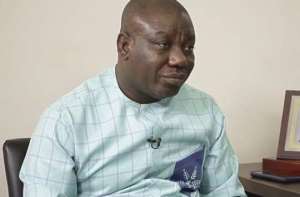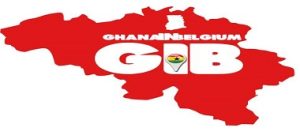
After more than three years of loud silence on concerns about Ghana’s indecent manipulation of macroeconomic data, the International Monetary Fund (IMF), on Saturday, 9th May 2020, reluctantly commented on the growing revelations of how the Akufo-Addo-Bawumia administration had been suppressing figures to help hide the true state of the economy and to deceive Ghanaians and by extension, investors and the international community.
The Country Representative of the IMF to Ghana, Dr Albert Touna Mama, is reported to have told JOY FM’s News File programme that the Fund was aware that figures presented to it were DIFFERENT (emphasis mine) from those presented to Ghanaians through the government’s official communications.
Dr Mama basically said that Ghana currently had two different sets of data which it choses from depending on the situation/purpose. According to him, the differences in the figures arose from a DISAGREEMENT (emphasise mine) between the Fund and the government on;
a). how fiscal deficit is calculated. He explained that while the fund insisted that the energy sector and the financial sector costs should be added in the calculation of the deficit, the government thought otherwise, hence the reasons for the differences in deficit figures for the 2017/18/19 fiscal years.
b). how gross and net international reserves are calculated. He again explained that while the Fund said that the petroleum funds should be excluded from GIR and NIR, the Bank of Ghana and the government were of the opinion that they should be included hence the reason for the differences in the figures with respect to those indices.
While I welcome the Fund’s intervention, albeit diplomatic and belated, I find it relevant to and revealing in the push for our government to be transparent and ethical in the presentation of the state of the economy to Ghanaians and the international community in general. I particularly find it to be a clear vindication of what NDC have been saying about the unethical doctoring of figures by the Akufo-Addo-Bawumia government as part of their grand scheme to run the country using creative accounting, PR, lies and propaganda. Unfortunately, no amount of diplomacy, enhanced lies and PR and whitewashing will save the government from the embarrassment that it has been causing itself.
Before I go into the substantive matter, please note that the NPP government, since its assumption of power in 2017, has never compiled and presented full year data on the management of the economy to Parliament as required by law. Since 2017, the Finance Minister has been presenting interim data to Parliament, a practice I recently decried when I appeared on the Wednesday Palaver, a programme by the Socialist Forum of Ghana, on Pan African TV. Thus, how our government used three months after the end of 2019 to get full year data for the performance of the economy in that fiscal year for the IMF but never had end of year data for 2018 for Ghanaians – 11 months after 2018 in the 2020 budget – and have still not reported 2017 final year figures to Parliament – after two full years of budget implementation – baffles me. It is obvious that but for the need to apply for the Rapid Credit Facility (RCF), Ghanaians would never have known the economic mess we are in. No wonder the Ministry of Finance issued a statement on May 10 in which it shamefully said that FactCheckGhana.com was comparing third quarter data with full year data.
Cooked fiscal data
Having said that the following observations are worth making from the IMF Country Representative’s intervention on the data manipulation;
1. The Country Representative’s response showed that the government admits that it has two different standards for reporting Ghana’s fiscal deficit and international reserves; the one that is internationally accepted and required by the IMF (which Ghana was using and complying with prior to 2017) and the one that only Akufo-Addo, Bawumia and Ken Ofori-Atta originated and believe in after assuming office. Now, depending on the purpose for which they are reporting data on Ghana’s economy, they choose the one they deem fit. This explains why Ghana has fiscal deficit figures for 2017, 2018 and 2019 that are different in government communications locally from those stated in the documents presented to and/or released by the IMF and investors. It also explains why the country has two different figures for gross and net international reserves for those three years in the Bank of Ghana’s documents and the government of Ghana budgets on the one hand and documents released by the IMF. So, whenever Dr Bawumia says that he is comparing the performance of the NDC’s four years with the NPP’s three-year performance, what data is he always using? Does he always use the credible one that has been smuggled to and/released by the IMF or the massaged one that the IMF does not trust and continually refine to meet the internationally-accepted requirement?
2. In the case of the fiscal deficit, the IMF’s Resident Representative’s response showed that while the government successfully suppressed the numbers in the data that it presented to Ghanaains, it could not do that with regards to the data it presented to the IMF and investors obviously because those two insist on sticking to the internationally-accepted way of calculating the deficit. In times when the government suppressed the data, the IMF Resident Representative admitted that the Fund had to recalculate them to meet the required standards. Thus, the government was forced to add what it sought to exclude from its data when calculating the fiscal deficits for 2017, 2018 and 2019.
In fact, prior to granting the interview, the IMF had, in the 2019 Article IV Report, explained why, in its view, Ghana’s calculation of the fiscal deficit was flawed and not compliant with best practice. In the report released in December 2019, the Fund said “Best international practice would include these transactions (the energy and financial sectors costs) above the line, as they reflect either direct government obligations or government transfers to SOEs.” The Fund went further to state that “spending on roads (Cocobod) and potentially infrastructure collateralised on bauxite (Sinohydro) should be recorded in the central government budget.”
IMF doesn’t produce data
Globally, the IMF works with countries to obtain data on the status of their economies. Therefore, the Fund cannot have data on Ghana’s economy that does not originate from the government. However, since the government sort to suppress its overall balance by excluding the costs of energy sector and financial sector payments and payments to contractors it made through Fidelity Bank, which are contrary to internationally-accepted way of calculating deficits, and reported same to Ghanaians, it could not do same when reporting to the IMF.
Key questions arise at this point. a). Are the data presented to and/or generated and released by the IMF reflective of Ghana’s true economic indicators? The answer is yes. b). Does the Akufo-Addo-Bawumia government agree with that data presented to and/generated by the IMF? The answer is yes. c). Has the government ever reported the data it presented to the IMF to Ghanaians? The answer is no.
At this moment, it is obvious that the international community will evaluate Ghana not by the data cooked for Ghanaians but by the data that was agreed with and presented to and/or generated by the IMF. d). Does this put us in good light? The answer is no. Now, you are free to make your own conclusions.
Deceitful international reserves
3. On international reserves, as the IMF’s Resident Representative said, the Akufo-Addo-Bawumia government has been inflating Ghana’s gross and net international reserves by adding the petroleum funds, which are incumbered, and that is contrary to the internationally-accepted methodology. It is obviously clear that Ghana cannot have its own set of reporting standards on international reserves different from the IMF balance of payment manual five (BPM 5), which all countries are enjoined to comply with. A dispute should, therefore, never arise with methodology with IMF because once that happens, foreign investors will not trust that data. That is why it is an embarrassment of international stature to seek to inflate your reserves through clever accounting in complete lack of compliance with the rules of the ‘Bible’ used by all Contral Banks the world over.
Instructively and as has been admitted by the IMF Resident Representative, the government made sure that its report to the Fund was accurate in response to the IMF staff concerns. However, that was not the case with the data reported to Ghanaians. It is obvious that thr government at the moment values thr IMF more than Ghanaians when it comes to compliance with standards and credibility in data.
Suppressed and manipulated public debt
4. The disparities in the data presented to Ghanaians and those presented to or released by the IMF are not limited to only fiscal deficits and international reserves. They extend to gross public debt and debt-to-GDP ratio. However, Dr Mama of the IMF, in his response to JOF FM, limited himself to the deficit and the reserves because those were the two reported by the Factcheck Ghana.com.
However, the document released by the IMF in April 2020 contained disparity in public debt too. The IMF report quoted Ghana’s nominal GDP at GHS347 billion and a debt-to-GDP ratio of 61.1%. This gives a public debt of GHS212 billion. In the government’s communications locally, however, the debt stock is quoted at GHS203 billion, representing a whopping GHS9 billion difference. This means that about GHS9 billion was removed from our public debt.
5. This is the first time in our history that Ghana is operating with two different sets of data on fiscal deficit, international reserves, debt stock and debt-to-GDP ratio; one set (which is more appealing) for Ghanaians and another (which is unappealing) for the IMF and investors. This is the practice that the IMF Country Resident Representative shockingly admitted to but said “we can agree to disagree. ” The strange thing though is that in the eyes of the government, both data sets are supposed to reflect the status of one economy; the one superintendented by Akufo-Addo and Bawumia and their 127 multitude of ministers. If this is not the height of disgustful deception, then I wonder what it is.
Disgraceful GRA Thanksgiving
6. The application of creative accounting, the resort to manipulation and cooking of data and the use of naked lies to run the economy is not limited to only the fiscal deficit and the international reserves. It extends to almost every sphere of government machinery.
Last year, I had cause to dispute a claim by the Ghana Revenue Authority (GRA) that the government had exceeded its revenue targets for the 2019 fiscal year. My disputation was in response to separate claims by the Board Chairman of the GRA, Prof. Stephen Adei, and the Commissioner-General of the Authority, Mr Amisshaddai Owusu-Amoah, that the authority had collected more revenue than it was tasked to collect due to the government’s policy interventions. It is instructive to note that less than five months into making that claim, the GRA has backtracked and stated that it did not meet its 2019 targets.
In a Memo signed by the Commissioner-General and dated 9th April, 2019., the Authority said that GRA “did not meet the original target set by the Ministry of Finance.” In fact, the fiscal data released by the Ministry of Finance for the 2019 fiscal year show that GRA missed almost all its targets on revenue mobilisation lines in that year. The question that then arose after reading that memo and the data earlier released was “what successful meeting and exceeding of target was GRA celebrating and thanking God for; a Thanksgiving that started in Accra and ended in Kumasi?” Like I have said before, the GRA took inspiration from the Ministry of Finance and, indeed the government, to deceive Ghanaians on its operations. However, when reality caught up with the Authority when its Staff demanded for the payment of their bonuses, the GRA had no option than to come clean on its revenue mobilisation targets and the actuals. Mind you, it is the same reality that caught up with the government when it was forced to come clean on the economy or be denied a loan that it so desperately needed fdom the IMF.
Other burning issues to peruse
- It is obvious that creative accounting and data manipulation are now a trait of the government. It is such that the data is cooked at the Ministry of Finance, dished by the Bank of Ghana and the Jubilee House and parroted by Dr Bawumia, the Walewale Adam Smith whose claim to and sustenance of fame was and has been a resort to clever deception through empty lectures and townhall meetings. Thus, while I thank the IMF for confirming that the government had been manipulating data on Ghana’s economy and had subsequently prepared two data sets which it uses, Ghanaians need to appreciate that the deception and cooking of data is widespread. In my subsequent public engagements/write up, I shall be exposing how the government also engages in double budgeting as part of its grand scheme to inflate expenditure and use the excess for dubious ventures.
Meanwhile, thank you, IMF and Dr Albert Touna Mama, for confirming a distasteful act that the Akufo-Addo-Bawumia administration have been perfecting and using to deceive Ghanaians.
written by: Isaac Adongo
google.com, pub-6336011652228911, DIRECT, f08c47fec0942fa0










